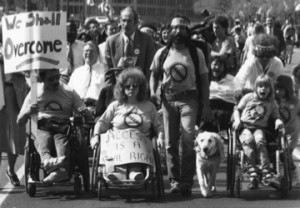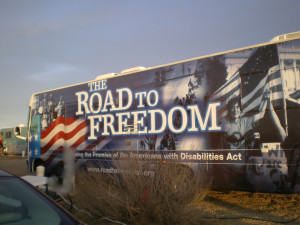NCIL’s Mental Health Civil Rights Task Force continues to follow two significant pieces of federal mental health legislation. As you may recall, Representative Tim Murphy introduced H.R. 3717, the “Helping Families in Mental Health Crisis Act of 2013” last December. This bill would reauthorize SAMHSA programs without the reforms NCIL supports. It also singles out people who are “disabled” (but not dangerous) for involuntary treatment. The bill also cuts support for advocacy and mental health peer support. NCIL opposes H.R. 3717 and other bills that single out people for reduced rights based on disability.
Recently, Representative Ron Barber introduced H.R. 4574, the “Strengthening Mental Health in Our Communities Act of 2014”. This bill also reauthorizes SAMHSA programs without the reforms NCIL supports.
NCIL supports H.R. 4574. We urge Representatives to support amendment of the bill with the following reforms:
- A majority of consumers should be established on state mental health planning and advisory councils (which are required to review and comment on state community mental health block grant – MHBG plans)
- Each state should provide for consumer peer support organizations and / or consumer-run community mental health services in its MHBG plan; and
- State mental health planning and advisory councils should coordinate activities with Statewide Independent Living Councils under section 705 of the Rehabilitation Act.
Please contact your members of Congress regarding these bills. If you’ll be attending NCIL’s Annual Conference next month, updates on this topic will be provided as we prepare for Congressional Visits.
The NCIL Mental Health Civil Rights Task Force meets the first Thursday of every month at 3:00 Eastern. The next meeting will be on Thursday, August 7, 2014.
Special thanks to Mike Bachhuber for contributing to this report.

 Help Tom Olin get The 2008 “Road to Freedom Bus” back on the road. The bus, a 35’ foot RV, is slated to join The ADA Legacy Project’s (TALP) national Legacy Tour to celebrate the 25th anniversary of the Americans with Disabilities Act (July 26, 2015). The tour begins in Houston in July of 2014.
Help Tom Olin get The 2008 “Road to Freedom Bus” back on the road. The bus, a 35’ foot RV, is slated to join The ADA Legacy Project’s (TALP) national Legacy Tour to celebrate the 25th anniversary of the Americans with Disabilities Act (July 26, 2015). The tour begins in Houston in July of 2014. The bus is a central connection point on the Legacy tour, carrying the history of the ADA and other disability rights and justice issues. It will serve also as a backdrop at stops and events. The bus will be a platform for young emerging leaders communicating with older leaders, for allies and artists, organizations, and legislators.
The bus is a central connection point on the Legacy tour, carrying the history of the ADA and other disability rights and justice issues. It will serve also as a backdrop at stops and events. The bus will be a platform for young emerging leaders communicating with older leaders, for allies and artists, organizations, and legislators. 

